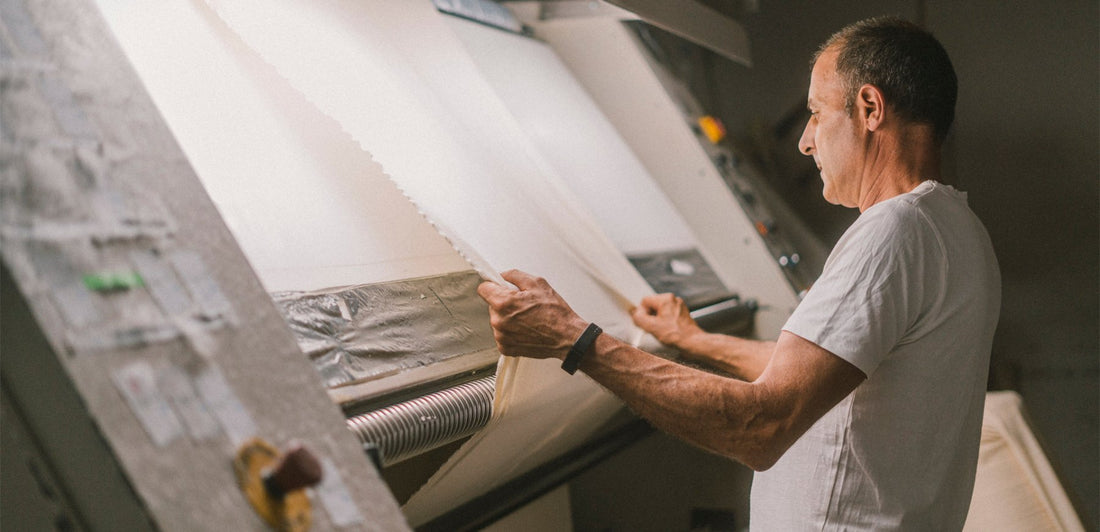Why We Produce Our Items In Northern Portugal
TWOTHIRDS has been producing clothing in northern Portugal for quite some time. It’s something we are proud of, given that many of the big fashion brands still rely on offshore labour (in Bangladesh, Vietnam, China etc), despite heavy environmental costs and social issues, typified by the 2013 Rana Plaza tragedy. It’s a result of our small size, independent spirit and ethical values that we ended up producing in Portugal! We chose the country based on 3 facets of Portugal’s textile industry. These are: 1. sustainability (top of our priority list) 2. craftsmanship & tradition, and 3. fair labour standards. In this blogpost we will be walking you through the ins and outs of each of these facets, while explaining how they relate to our mission, the sustainability of our clothing, and the quality of our products.
1. Sustainability

Why is Portuguese textile production more sustainable? Well, every Portuguese clothing manufacturer must comply with environmental legislation from the European Union in order to operate. That means an environmental assessment needs to be undertaken before they begin making clothing. Waste management issues are also evaluated. Beyond this very important step, Portugal is also famed for its…
Access to sustainable fabrics
Portuguese companies - like our supplier, AAC - work very hard to source the most sustainable fibres on the market. These range from botanic fibres made from sustainably sourced wood pulp, to recycled yarns that make use of textile waste.
‘Wet process’ management
The production facilities we work with have on-site wastewater treatment plants, which contributes to safe and improved water quality in the Portuguese water cycle. This is vital in garment production, because if not correctly treated, chemicals and dyes can run-off into ecosystems, causing pollution. We value this aspect of Portuguese production because our focus as a brand is on ocean protection.
Accountability
One of the best benefits of producing so close to home is that we can visit our factories and trace the source of our products. This is quite rare within the industry and makes transparency that much easier. We want to take account of the impact we have on the planet, so it’s vital we know how deep our footprint goes. Building close factory relationships is therefore imperative.
Reduced emissions
Depending on where you are buying from, we expect the emissions of our products to be lower than those produced outside of the EU. Not only is that because of our pre-order system, which avoids waste, but also from the mere fact of reducing the distance our goods need to travel! Northern Portugal’s ‘regional synergy’ (linking multiple production processes together) further helps to reduce Greenhouse Gas emissions - which are having a critical impact on the planet’s health.
2. Craftsmanship / Tradition


It is often said that “Portugal has one of the strongest textile industries in Europe”. Partly, this is a quirk of history: Portugal has been producing high quality garments since the 18th century. It has maintained this reputation through the centuries, expanding from a handful of family owned factories into more modernised facilities that still retain their proud artisanal history. For that reason the label “Made in Portugal” is synonymous with premium quality textiles and expert craftsmanship.
This robust textile industry (and the fact that it is based in a politically stable country) also means that our partner factories are less vulnerable to global economic and logistical shocks. This was true of 2020 & 2021, which saw many companies experiencing delays due to freight and post-covid issues and 2022, which has seen the war between Russia and Ukraine rock the world’s access to affordable energy. In both situations, our factories have shown their resilience.
3. Fair working conditions


These days, the issue of ethical fashion is a huge one. It’s tragic to think it took a massive human disaster (Rana Plaza in Bangladesh) to shine a light on the abuses of the fast fashion industry. Customers now expect brands to enforce safe work practices - and they should. “Near-shoring” - the opposite to off-shoring - the production of our garments allows us to gain a greater insight into the welfare of the people who make our clothing. Fair working conditions are super important to us, so it’s a comfort to know that Portugal maintains a minimum living wage, appropriate working hours, and has low risk of exploitation. As previously mentioned, production facilities must comply with environmental regulations, meaning that garment workers should not be in direct contact with hazardous chemicals. This prevents some of the human risks associated with producing in external nations. Portugal is also a member of many organisations that champion human rights including the United Nations, International Labour Organization, UNESCO and Hague Conference on Private International Law.
What’s the difference between ethical and sustainable? As we’ve written in the past:
Ethical means happy humans.
Sustainable means happy habitats.
And while there’s usually an overlap between the two (they are certainly not a binary), you can trust us to deliver both!









